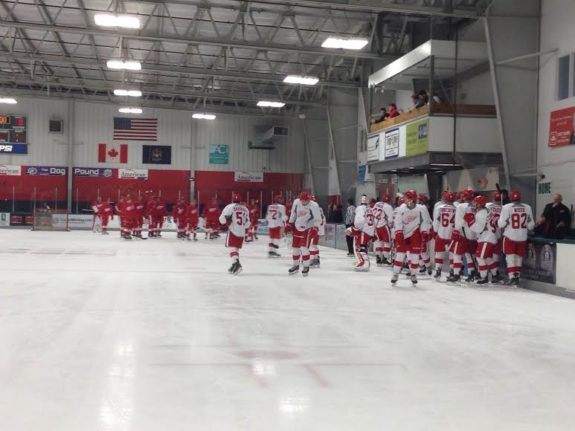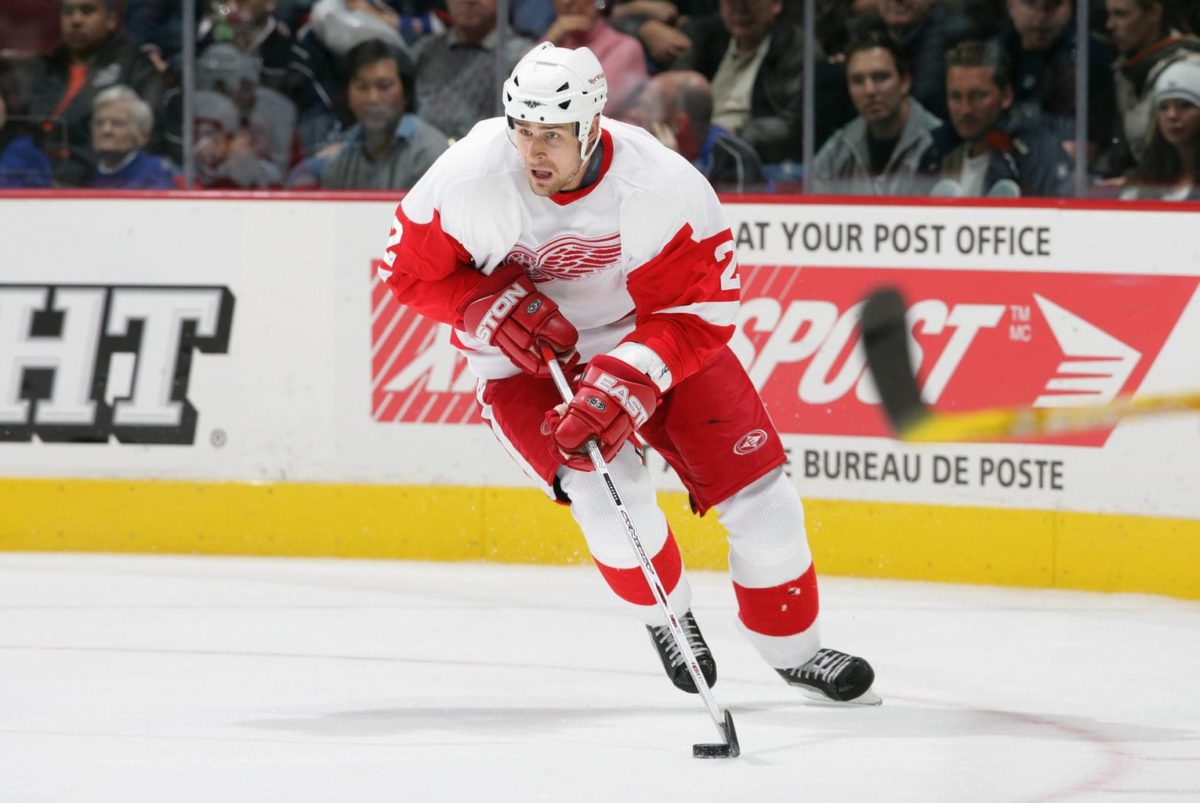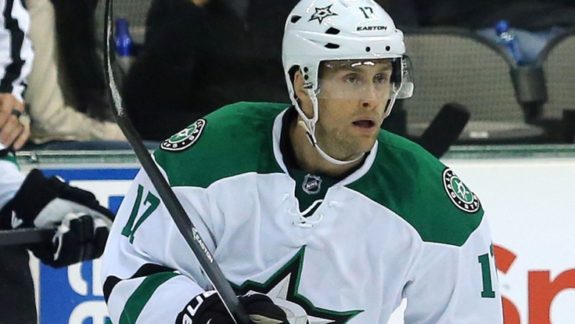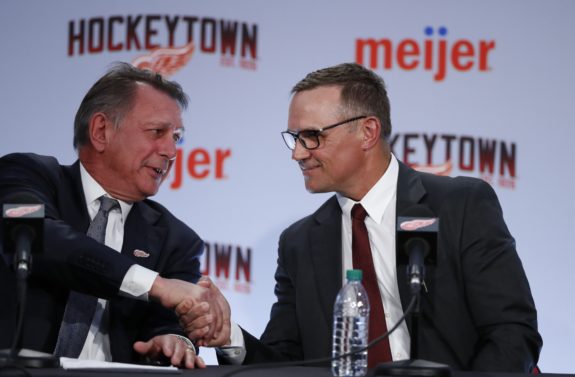For many Detroit Red Wing fans, the scariest scene to ever play out during a game of hockey came on the night of November 21, 2005. Less than two months into the first season following the 2004-05 lockout, the Red Wings were hit with a gut punch that reverberated across the NHL.
According to the American Heart Association, a normal resting heart rate is between 60 and 100 beats per minute (bpm). When you exercise, you want to keep your heart rate well below 220 bpm – the closer you get to that number, the risk of cardiac arrest or other complications with the heart becomes greater.
Related: Wayne Gretzky Almost Joined the Detroit Red Wings
On that infamous night, just over 12 minutes into a game against the Nashville Predators, Red Wings’ defenseman Jiri Fischer’s heart reached a staggering 300 bpm. A short time after reaching the Red Wings’ bench, he collapsed onto his teammate Brett Lebda. As his coaches and teammates rushed to stop the game and get the necessary medical personnel over to help, his body began to shut down. At some point, amidst an eerily silent crowd at Joe Louis Arena, his heart stopped beating.
Fischer was minutes, if not moments away from being gone forever.
But that fateful night during the 2005-06 season is not the crux of Fischer’s story. This isn’t just a story about facing and overcoming death – it’s a story about following your dream, even if it manifests itself in a different way than you envisioned.
Rising Star
When the Red Wings’ prospects take the ice to participate in the famous Traverse City Prospects Tournament, a longtime Red Wings fan with a keen eye will notice a familiar face watching from somewhere around the rink. No longer does Fischer wear a helmet and skates; nowadays you’ll see him clad in either a suit or some other Red Wings-branded athleisure clothing.

As the organization’s director of player evaluation, he has a personal stake in the players on the ice during that tournament. And yet, it wasn’t all that long ago that Fischer himself was one of those prospects strutting his stuff on the ice at Traverse City.
From 1997 to 2005, the Red Wings had a pick in the first round of the draft just three times. The first of those three picks came in 1998 when the Red Wings took Fischer at 25th overall.
The native of the Czech Republic made the transition to North American hockey in the QMJHL during his draft year. While his first season there wasn’t anything overly special, he did establish himself as a physical defender who racked up penalty minutes. The next season – his final in the “Q” – he added offense to his game, collecting 78 points in 65 games, and another 23 points in 23 playoff games.
Suddenly, Fischer looked like a two-way behemoth on the blue line. At 6-foot-5, you couldn’t miss him out on the ice. Heading into his first professional season, Fischer looked to provide youth and size to a Red Wings’ blue line that could use both components.
Welcome to the Big Leagues
Across his first two seasons in the NHL, Fischer played 107 games and collected 17 points. While he struggled to recreate the offensive touch that he showed during his final season in juniors, he generally played solid, simple hockey. He used his physical gifts to defend the zone, and slowly but surely earned the trust of head coach Scotty Bowman.

It was during the 2001-02 season, the third of his career, that Fischer cemented his place on the Red Wings’ blue line. The Red Wings boasted a roster filled to the brim with future members of the Hall of Fame, and yet there was Fischer at 21 years old, playing around 17 minutes a night, and helping his team march to a Stanley Cup championship. He was the last player to leave the ice the night they won the Cup.
His most productive season came in 2003-04 when he played in 81 games and collected 19 points. Even into his next season in 2005-06, Fischer found a role as a depth defender for the Red Wings. He played alongside legendary defender Chris Chelios, whose hockey knowledge surely helped out the young defender. Had that season played out differently, Fischer may have become something similar to the Chicago Blackhawks’ Brent Seabrook (in his prime.)
One of the Lucky Ones
Just two years after the incident involving Fischer, the hockey world grieved as Alexei Cherepanov – a first-round pick of the New York Rangers in the 2007 draft – succumbed to a similar situation as the one Fischer faced.
On March 10, 2014, Rich Peverley of the Dallas Stars collapsed on the Stars’ bench. Luckily for Peverley, the NHL put systems and protocols into place in order to ensure that a player in his position has a fighting chance of survival.

Those life-saving measures, such as making sure that every team/arena has a defibrillator on-hand in case the unexpected happens, were put into place because of Fischer and how close he was to an untimely death.
Retirement
Thankfully, Fischer escaped with his life. However, with the knowledge that he would never be medically cleared to return to action in the NHL, he was forced to call it quits. By the end of the 2006-07 season, his contract was up, and it looked like his days involved with the game of hockey were over.
Related: Red Wings’ All-Time Greatest Lines
To this day, the Red Wings run their organization like a giant family. Former general manager Ken Holland was a goalie and then a scout for the Red Wings. Steve Yzerman, the longtime captain of the franchise, became a vice president with the organization, and after some time in Tampa Bay, returned to take over for Holland as general manager. Look throughout the Red Wings’ front office and you’ll find many people with different ties to the organization.
So perhaps it was no surprise when Holland approached Fischer with an opportunity outside the rink.
I think the reason it’s not hard [to see Fischer] is that he is so upbeat. He’s very positive, very optimistic. And I think that’s what keeps him going.
Ken Holland – former Red Wings general manager
That positive energy is easy to observe when you listen to Fischer talk hockey. Today, he serves as a teacher for the team’s young guys both in the system and on the ice at Little Caesar’s Arena – just like Chelios was for him. He helps players identify their strengths and how to play into them. He also works with the scouting department to identify players both inside and outside the NHL for the Red Wings to potentially target. You have to both understand and love the game of hockey in order to do this job with any success.
Fischer started this job after a successful stint as the organization’s director of player development from 2007 to 2016 – the role that Holland offered him. Despite the regime change once Yzerman took over as GM of the Red Wings, Fischer was retained.

As Fischer and Yzerman work together to bring the Red Wings back to the prosperity they knew as players, it’s easy to remember the image of Yzerman, the team captain, and Kris Draper skating a stretcher over to the Red Wings’ bench as Fischer fought for his life.
Going Strong
Even though he won the fight, it was understandably difficult to say goodbye and retire from the sport – especially at the young age of 27. But his infectious attitude and work ethic paved the way for a career off the ice. Though he likely wouldn’t want to relive that fateful night, he just as likely wouldn’t change anything about how things turned out. He may not go down as one of the all-time Red Wing greats, but few can match the impact that Fischer has had on the NHL, the Red Wings and their fans.
Although the specifics of Fischer’s story are uncommon (thankfully so) there’s a greater truth to be gleaned from all of this. Whether you’re a first-round pick or just a kid with a dream, some things are out of your control. Even if you’re in great physical condition, your heart can simply give out. The world does its best to constantly remind us of our mortality, with some instances being scarier than others.
But if you’re like Fischer, even the cruel hands of death can’t deter you from chasing and living out your dream. And when you face the toughest obstacles and still overcome them, that’s how you triumph over tragedy.
That’s how you scratch the surface of immortality.